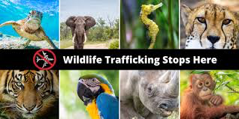Airports Council International (ACI) World has published guidance for airports in combatting the global illegal trade of protected species of wild animals and plants.
The ACI Combatting Wildlife Trafficking Handbook has been developed with the support of the USAID Reducing Opportunities for Unlawful Transport of Endangered Species (ROUTES) Partnership to assist airports in addressing this global crime.
Elephants are often poached for their ivory and tigers for their skins and bones, for example, but other species, such as rosewood, pangolins, birds, reptiles, rhinos and marine turtles, are also among commonly trafficked species.
The illegal wildlife trade is estimated to have an annual value of up to $23 billion (figures in US Dollars).
The handbook offers detailed case studies on the comprehensive work and strategies of individual airports engaged in this global challenge and draws on the experience of airports which have taken an active role against wildlife trafficking. It also provides guidance to airports on their role and the options that may be available to them to support industry action.
“Wildlife trafficking is a global crime that can touch any airport and requires concerted efforts and a coordinated global response to combat it and protect species for future generations. The cooperation with ROUTES is key to develop and support our members on these important task” ACI World Director General Luis Felipe de Oliveira said.
“The aviation industry is ideally placed to support this fight and, by working with our ROUTES partners to deliver resources such as this handbook, we continue to help raise awareness and encourage the community to support the protection of biodiversity.
“As we continue to navigate the COVID-19 pandemic and airports begins to see a resurgence in traffic, I believe now is the time to act and I encourage airports to join us in our commitment to combat wildlife trafficking.”
“ACI’s Combatting Wildlife Trafficking Handbook provides a great opportunity for airports globally to understand the role they can play in preventing this transnational crime. We welcome ACI’s continued efforts and commitment to providing information and resources to help their members address wildlife trafficking through the aviation sector,” Michelle Owen, ROUTES Lead added.
The resource contains materials that assist airports, irrespective of their size or geography, to play their part where possible. It promotes a comprehensive approach, that involves coordination with industry partners (such as airlines) and with law enforcement agencies (e.g., border protection and customs agents).
In addition to the handbook, ROUTES partners continue to develop a variety of resources to support the aviation industry, including airport specific resources, which are available on the ACI World website.










